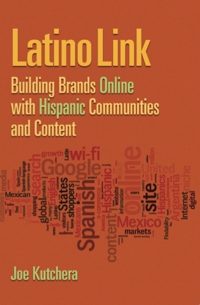This article originally appeared on MediaPost and is a preview of Latino Link: Building brands online with Hispanic communities and content from Paramount Books.
After reading Felipe Korzenny’s and Lee Vann’s column about Hispanics’ adoption of social media relative to other ethnic demographics, a question came to mind: how will social networks affect the acculturation process among Hispanics? The ability to keep in touch with family and friends from countries-of-origin via email, Skype and online newspapers back home makes it easier than ever. Travel costs are at historic lows. And computer and mobile phone prices fall every year.
Combine these questions with the fact that more communities like Miami and McAllen, Texas, are reaching the tipping point of having a majority of Spanish speakers, and the question about how online media affects acculturation deserves some consideration. Six experts discuss this issue, after which you are invited to leave your comments, links to research and additional questions below.
“Latinos have strong ties to their heritage and country of origin,” says Alvaro Palacios, the Regional Director of Business Development at Terra. “According to Pew’s Latino Youth report, only 33% of second-generation Hispanics claims to be American first, while 41% still prefer to name their country of origin. Even with third-generation Hispanics, only 50% consider themselves American first.”
“The Internet is definitely helping with the acculturation process among U.S. Hispanics, with new generations consuming English content on local sites and being almost 100% integrated into the U.S. culture,” says Marta Martinez, the CEO of StarMedia. “On the other hand, a large percentage of Hispanics consume Spanish sites here and from their country of origin. What the Internet brings to all of us is diversity and choice.”
“Being able to understand the culture and institutions in the country they are immigrating to will continue to be important,” says Tamara Barber, an analyst at Forrester Research. “But, these different avenues of connecting back home will certainly encourage stronger ties to their countries of origin and could develop into a phenomenon that we see among Hispanic youth, where they are very truly straddling two cultures. The beauty of social media in a cross-border context is that it can actually help immigrants develop more of a bicultural existence.”
“Digital technologies have made it much easier to stay in touch with friends and family from wherever they may be; however, I tend to look at acculturation as a choice,” says Christopher Stanley, CEO of Alcance Media Group. “If you live in a country for numerous years and need to live and work in the language, “acculturation” will happen. As a U.S. native living in Chile, I could have easily chosen to surround myself with other ‘gringos’ living abroad. However, I made the effort to learn the language and culture. Technology may make it more comfortable to stay in a bubble, but it ultimately is a choice.”
“Online Hispanics (excluding mobile) are primarily English-language dominant, meaning they are either U.S. born (second-generation), or came to the U.S. at an early age,” says Maria Lopez-Knowles, SVP of MRM Worldwide. “They also have the economic means to afford the technology that allows them to stay ‘connected,’ which in and of itself assumes some level of acculturation. Online Hispanics would have to be living in a virtual existence practically 24/7 for this to happen. Regardless of how connected they are, they still live in the U.S. So while I don’t think it limits the acculturation process, I believe that it impacts and reinforces the retro-acculturation process.”
“Acculturation by definition is not assimilation; it is the layering of native cultural experiences into a new cultural context,” says Kevin Conroy, president of Univision Interactive Media. “In other words, layering in ‘home country’ experiences over ‘U.S.’ experiences. This is the reason the use of the Spanish-language is still growing (77% speak Spanish at home) — Hispanics have not assimilated and lost their language identity, instead they have maintained their passion for their language and culture and woven them into their U.S. Hispanic experience. To that end, the Web brings value to this dynamic; it enables U.S. Hispanics to more easily stay current with their home country and cultural passion points while remaining very much members of the U.S. Hispanic community.”
What do you think?
![Reblog this post [with Zemanta]](https://img.zemanta.com/reblog_e.png?x-id=596d12f5-2a19-4b89-a7df-36f37adab3d4)






